Update 2024-26 RCPCH Global
Royal College of Paediatrics and Child Health
Leading the way in Children’s Health
RCPCH
Contents
3 Introduction
6 Country profiles
8 Rwanda
11 Nepal
13 Lebanon
15 Sierra Leone
17 Myanmar
20 Nigeria
21 Mul ti-country Assessment Programme (MCAP)
22 Humanitarian crises
22 Conclusion
23 Partners
Introduction
The Royal College of Paediatrics and Child Health (RCPCH) supports child health in the UK and internationally.
‘RCPCH Global’ is the small team within the College managing a portfolio of global maternal, perinatal, neonatal and child health programmes in selected partner countries around the world. Our humanitarian work is part of RCPCH’s wider international strategy which includes extensive delivery of formal education and examination services.
Strategic Focus
RCPCH Global’s humanitarian work focuses primarily on low- and lower-middle-income countries, where household poverty and weaknesses in health care provision – sometimes exacerbated by instability and conflict – create high levels of avoidable maternal, newborn and child morbidity and mortality.
Wherever possible, we work in partnership with sister paediatric bodies in programme countries – believing that long-run sustainability of positive changes can only be achieved by our in-country colleagues, and that ‘global health’ must be a matter of equitable exchange between equal partners working to the common aims of human health and the shared means of clinical and medical knowledge and skill.
We anchor our programmes in the hospital sector of partner countries, concentrating on improving quality in the secondary level of care – believing that evidence of global slowdown in mortality reduction, in particular for neonates, points to chronic underinvestment and consequent weakness in this critical tier of an integrated health system.
Integrated improvement
Over the last decade, we have focused on bringing down mortality for newborns and children –key targets of the Sustainable Development Goals (SDG). In this we have seen some significant success.
Our approach has been to integrate clinical skills-building through teaching and training within a wider set of improvements in hospital system function – from procurement and availability of essential medicines, through enhancement and maintenance of critical equipment, to infrastructure planning, patient pathway, workforce planning and facility leadership. We have worked with local partners to build ‘clusters’ of hospitals, working together in a network of regular communication and information sharing, comparing cases and management strategies as a means of accelerating learning and improvement.
We have championed the vital clinical and care role of nurses and midwives – strengthening the linkages between maternal and neonatal care delivery; and we have increasingly seen the enormous potential of parent-led and family-centred care in rationalising the distribution of tasks and improving an array of mother and child health outcomes.
Underpinning all of our work, we seek to strengthen health information – from raw data to policy analysis – as the fundamental currency of health and care quality improvement.
3 RCPCH Global: Update 2024-26
The way ahead
Reducing avoidable death among mothers, babies and young children – often through more effective management of the perinatal period and of widely prevalent infectious diseases – is at the heart of our work. But over time, we see too how the epidemiology of morbidity and the burden of health challenges changes as technologies of care and wider conditions of socioeconomic development themselves change.
We need, in response to this dynamism, to look forward towards new and emerging challenges –to the rising rates of paediatric noncommunicable disease, for example, as much as we look back to the management of residual challenges from the past.
In recent years, as we have seen perinatal care quality improve, we have become increasingly engaged in the management of the consequences of smaller, sicker babies surviving into childhood – in supporting identification of developmental delays and emergent disabilities, and in the development of the clinical and institutional architecture necessary for long-term familyfocused disability care.
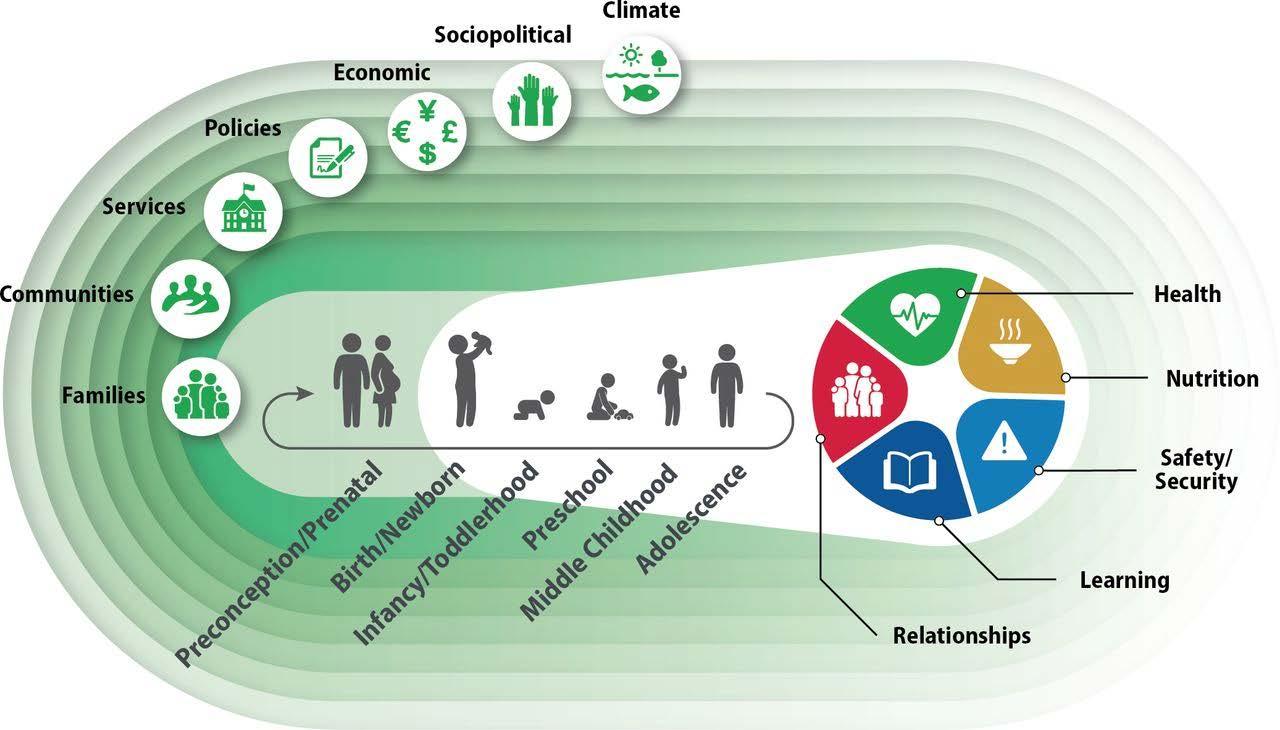
Image source: The principles of Nurturing Care promote human capital and mitigate adversities from preconception through adolescence. BMJ Journals, Vol 6, Issue 4. Available at https://gh.bmj. com/content/6/4/e004436
4 RCPCH Global: Update 2024-26
Global child health – getting involved
We seek to encourage as wide a participation as possible in the global work of the college. In the nature of ‘global child health’, participation is just as possible and as meaningful at home in the UK as it is overseas in a partner country.
We recruit clinicians – nurses, doctors, midwives, paediatric and obstetric specialists, community paediatricians, specialists in early child development – as well as programme coordinators, data analysts and desk and field-based researchers.
We recruit senior consultants and others with relevant skills to form ‘programme advisory boards’ for each of our strategic partner country programmes.
We work across specialties and disciplinary boundaries, seeking wherever possible to amplify our reach and impact through partnership with other Royal Colleges, with international and local NGOs, with UN agencies and with government counterparts.
We engage in, and support, global child health advocacy initiatives – both those initiated by the College and those of other agencies which the College can and should support.
We participate in UK and international research forums and professional conferences, presenting our own partnership programmes, and collaborating with others in the presentation of emerging themes and issues.
We work with academic and research partners, drawing on data from our programme interventions, and engaging with wider health datasets to understand how global child health is changing.
And we design and deliver training, in the field and in the UK, to build core skills in global child health knowledge and practice.
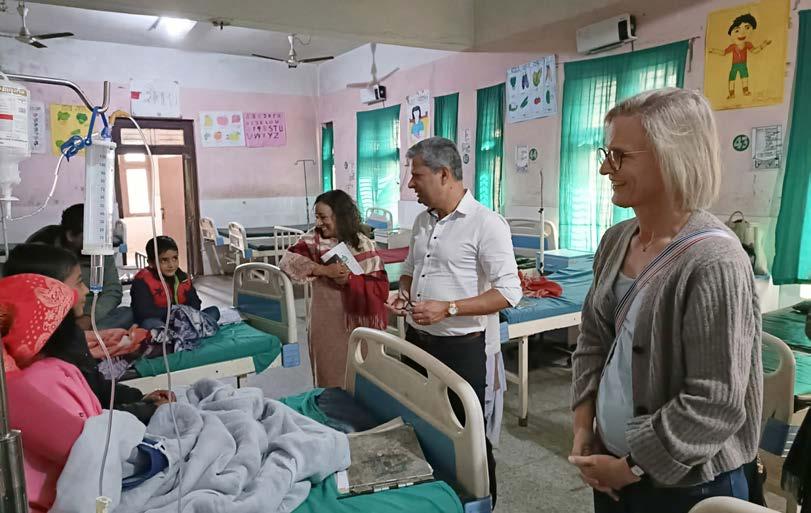
5 RCPCH Global: Update 2024-26
Country Profiles
Sierra Leone
Supporting Ministry of Health, international and local partners in advancing the Sierra Leone Child Survival Action Plan
Lebanon
Supporting prevention, monitoring and therapeutic care for children with developmental delays and disablity in Palestinian refugee communities in Lebanon
Nigeria
Pilot partnership with Osun State and Obafemi Awolowo University to support perinatal and neonatal care quality improvement and early child developmental monitoring
Rwanda
Working in partnership with Rwanda Paediatric Association and Ministry of Health/RBC to strengthen perinatal care quality across the Rwanda health system
6
RCPCH Global
Pakistan
Establishing partnership working in Sindh Province to assess quality of secondary perinatal and paediatric care
Nepal
Developing provincial model of hospital network strengthening in neonatal and paediatric care
India
Extending partnership through structured assessment of secondary perinatal and paediatric care quality in Maharashtra State
Myanmar
Building humanitarian support for nurses, midwives and doctors delivering critical care services in conditions of conflict
7
RCPCH Global
Rwanda
RCPCH Global works in partnership with the Rwanda Paediatric Association (RPA), under the guidance of the Government of Rwanda through the Ministry of Health and the Rwanda Biomedical Center (RBC). Our work is generously supported financially and technically by partnerships with UNICEF and the James Percy Foundation.
Over a decade, RCPCH and RPA have built up a country programme designed to support Rwanda’s impressive track record and iron-clad commitment to improving maternal, newborn and child health indicators and hitting – or exceeding – its SDG targets.
We work in district and referral hospitals across much of the country, as well as reaching out to selected primary health centres.
Because we have pursued a long-term partnership in Rwanda, we are able to track long-run change in our programme activities and resulting care quality and mortality outcomes. From 2017 to 2023, across our programme hospitals, we have seen a reduction in newborn deaths from 11.8% to 6.2%, a reduction of 47.5%. Similarly, maternal mortality across programme facilities have reduced from 70 per 100,000 live births to 47 per 100,000 in 2023, a reduction of 33%. These are a result of other improvements in clinical care service delivery, such as rapid administration of oxytocin (within 1 min of delivery) from 88.3% in 2021 to 98.1% in 2023, leading to better management of postpartum haemorrhage (seen in graph below) and reduction in post-C section infection rates from 3.1 in 2018 to 1.9% by 2023.
Our work in Rwanda goes beyond facility-based clinical care service delivery improvements. Taking a holistic approach to improvement of perinatal care service delivery, we work on mentorship models which focus on continuous in-situ support to frontline clinical practice from the delivery suite to the neonatal unit. As part of this strategic process, RCPCH and RPA, in collaboration with other local NGOs including Partners in Health and the Rwandan Association of Neonatal Nurses, are developing a neonatal nursing orientation package, deliverable to all nurses as part of hospital accreditation, broadening the sustainable base of neonatal care knowledge and skills across each facility.
8 RCPCH Global: Update 2024-26
0 0.5 1 1.5 2 2.5 3 3.5 4 4.5 2023 2022 2021 2020 Average percentage Attribute 2020 2021 2022 2023 Deliveries at health facility 74,634 79,967 86,699 70,493
Figure 1: Reduction of cases of postpartum haemorrhage between 2020 (pre-intervention) and Oct 2023.
Quality improvement initiatives are led by hospital staff and their implementation is supported by mentors (senior hospital clinicians, consultants from local partners and RCPCH). Improvement strategies incorporate systemic functions - for example extending ‘respectful maternity care from primary clinic to hospital level, with more focused clinical functions such as manual delivery skills and enhanced capabilites in newborn resuscitation.
Long-term partnership has enabled us to build strong relationships of trust with the wider health sector ecosystem – from Ministry of Health and its implementing arm, RBC, through national Technical Working Groups on Reproductive, Maternal, Newborn, Child and Adolescent Health, to individual hospital Director-Generals and the wide clinical community of paediatricians, obstetricians, nurses, midwives, quality improvement officers and data managers in each facility.

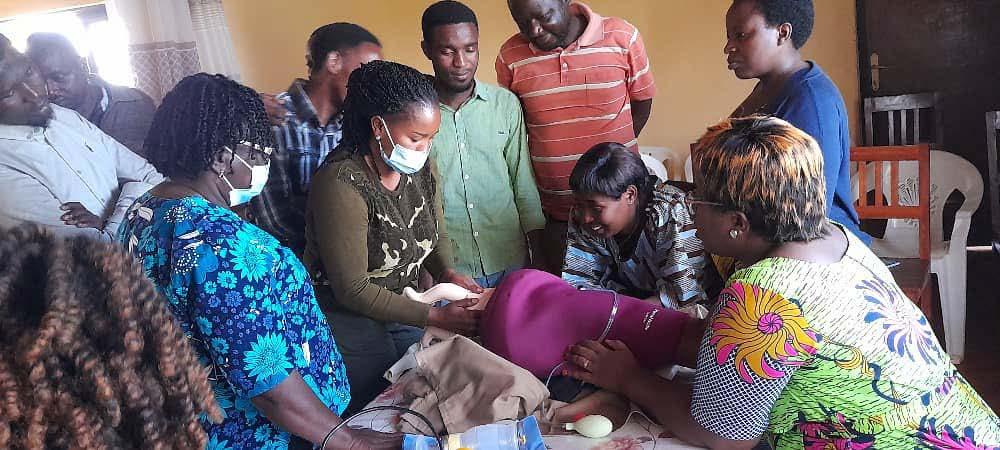
We complement clinical and quality improvement with advocacy from local to national level, liaising with hospital management and government stakeholders on institutionalisation of best practices as part of regular provision of perinatal service delivery. With initiatives such as this, RCPCH Global’s work seeks to effect long-lasting change in health systems structure and services for continued improvement and local ownership.
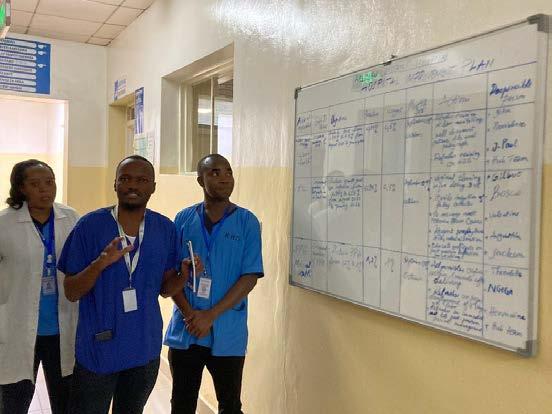
9 RCPCH Global: Update 2024-26
Figure 2: Participants of the Neonatal Nursing Orientation Programme in January 2023
Figure 3: Training Session on breech delivery by a maternity champion at a partner district hospital
Figure 4: Hospital champion team presenting a Quality Improvement Plan at a district hospital.
Rwanda stats:
636,147 deliveries supported
912 training sessions delivered each year
2772 clinical audits done each year
85% of our hospitals have reported improved equipment levels and maintenance
252 cluster meetings organised each year
100,677 newborns supported in NNUs
5040 mentorship sessions delivered each year
192 outreach visits done each year
10 RCPCH Global: Update 2024-26
Nepal
Our programme in Nepal is comparatively new – established in 2021 through a partnership with the Nepal Paediatric Society (NEPAS), UNICEF, and the Ministry of Health and Population both at federal and provincial level in Madesh Pradesh (‘Province 2’) in the southern ‘terai’.
Nepal has made significant progress in maternal and child survival over the last 20 years, much of this achieved through innovative and high-impact interventions supporting community and primary health care levels. In the last decade, though, progress has slowed, as more complex pregnancies and smaller and sicker babies seek higher level, secondary clinical care.






Alongside this we have worked with NEPAS to develop, de novo, the first NEPAS standards for hospital care for newborns and children, the first time the RCPCH has been involved in this type of work. These standards, mainly simple to follow flow diagrams for key conditions, continue to grow and .develop in number and content and and are available on paper, web and app form.
Central to our partnership strategy will be is unlocking and building on the extraordinary potential of Nepal’s existing cadres of child health clinician. We will seek to explore, design and test programme delivery modalities, blending in-situ support with remote/virtual intervention, maximising our ability to scale up effective QI models across the country’s varied and challenging geography.
Building on our quality improvement strategy in Myanmar, RCPCH Global and NEPAS are forging networks of hospitals within Province 2 (see Figs. 8 & 9), each led from within by local clinical champions and linked together through ‘quality support’ mentorship teams.
In the early phase of the partnership, we have identified key areas for improvement – from effective front-of-hospital triage (see Fig. 7), through improved management of priority paediatric and neonatal conditions and better distribution of case severity via stronger referral systems, to more robust approaches to health
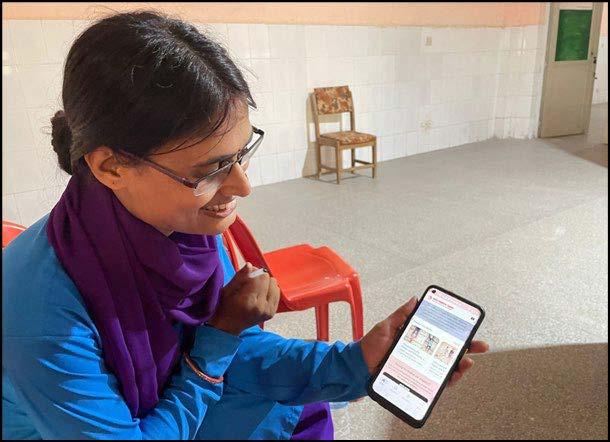
11 RCPCH Global: Update 2024-26
Figure 6: Digital innovation is key to futurefacing support for local clinicians
Clinical skills Clinical knowledge
A system that supports good care
Figure 5: An integrated model of programme design
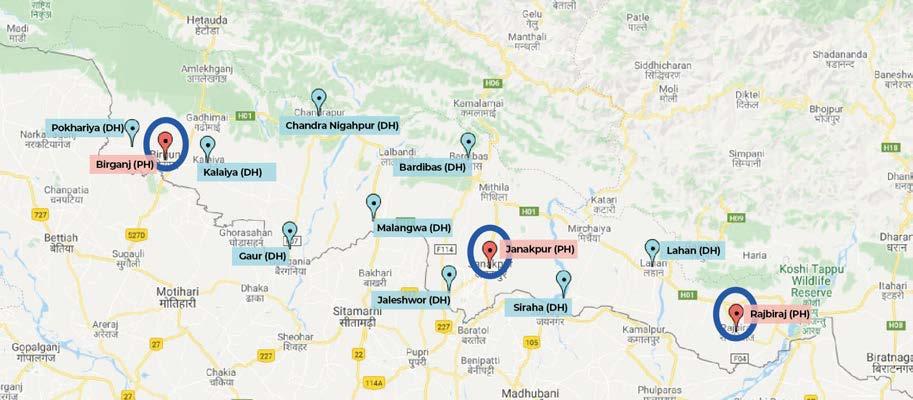
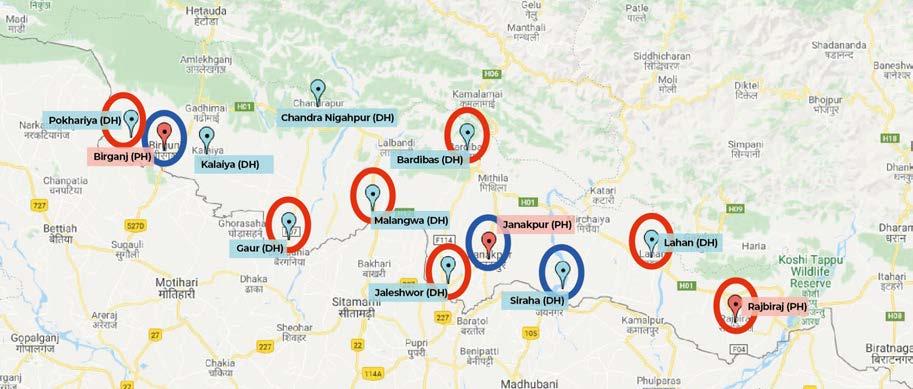
12 RCPCH Global: Update 2024-26 0% 10% 20% 30% 40% 50% 60% 70% 80% 90% 100% May - June 2022 Aug - Sept 2022 Oct - Nov 2022 Dec 2022 - Jan 2023 Feb -March 2023 April - May 2023 June - July 2023 Aug- Sep 2023 Oct - Nov 2023 % of hospitals with triage system Resp rate taken on arrival Pulse taken on arrival Temp taken on arrival
Figure 7: Triage systems in ER and vital signs on arrival
Figure 8: March 2022 – Equipped and active NICU/SNCU hospitals (blue circles)
Figure 9: January 2024 – New equipped and active NICU/SNCU hospitals (red circles)
Lebanon
Following a generous legacy gift to the College, RCPCH Global has been developing a programme of work to engage with and address problems of early child development and childhood disability among Palestinian refugee communities in the camps in Lebanon.
Our aim is to engage with, understand and help to address developmental delays and cognitive disabilities with a relatively high prevalence rate among refugee households – which tend to receive less attention than physical disability in humanitarian settings.
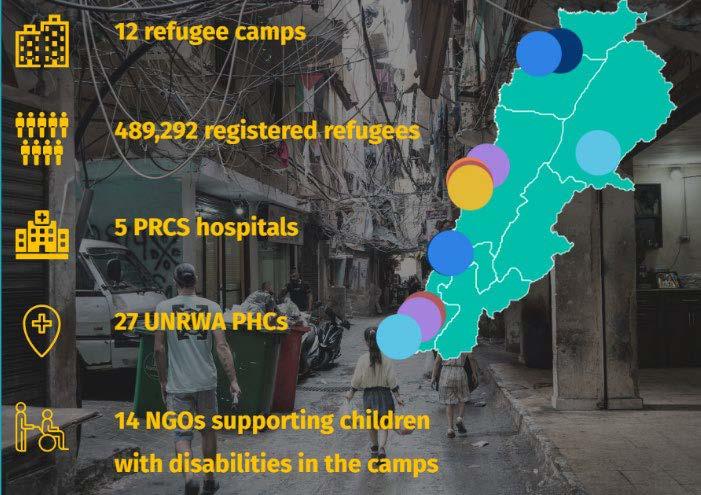
The programme is a multi-agency partnership between RCPCH, Medical Aid for Palestinians (MAP), the UN Relief and Works Agency (UNRWA), the Palestinian Red Crescent Society (PRCS) and the Palestinian Disability Forum (PDF). It is designed as a three-stage intervention (see Fig. 11):
• Mitigating risk factors for developmental challenge and cognitive disability by supporting quality improvement in perinatal care at the PRCS hospitals
• Improving timely identification of developmental delays and emerging disability, strengthening attention to child welfare issues still suffering wide stigma
• Supporting local organisations offering accessible therapeutic care to develop referral and network pathways for integrated management of childhood disability
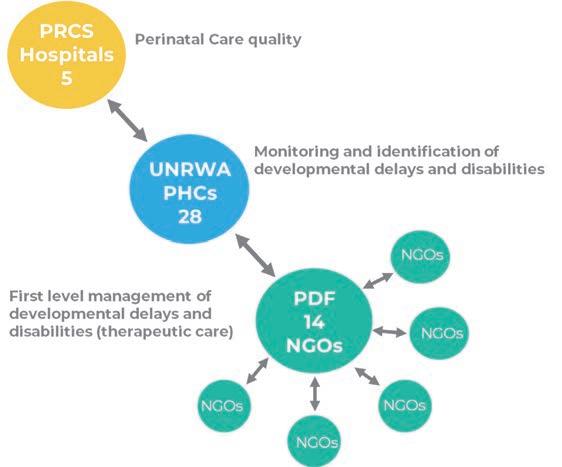
The operating environment in which this programme is being rolled out is particularly complex – with very significant challenges relating to the wider regional crisis. In all circumstances, RCPCH Global’s strategic focus is shaped solely by the health and welfare needs of children and families, wherever they may be, and on maximising opportunities to harness the College’s unique capabilities in offering solutions.
13 RCPCH Global: Update 2024-26
Figure 11: Working across from perinatal care through newborn screening to therapeutic intervention
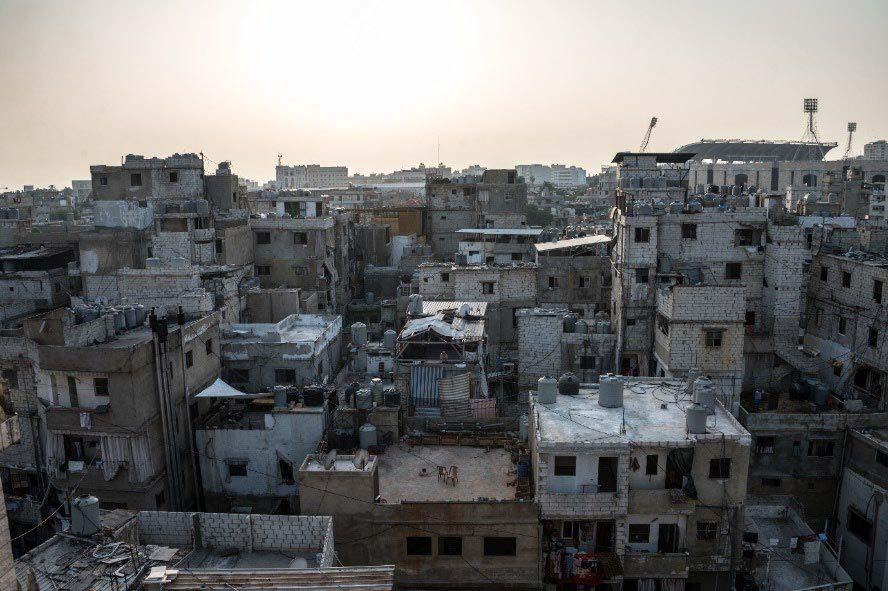
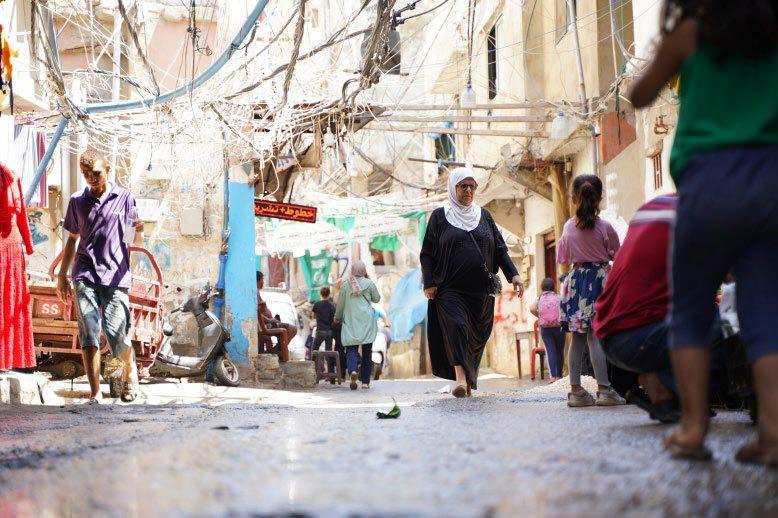
14 RCPCH Global: Update 2024-26
Figure 12: Palestinian refugee ‘camps’ are, in reality, urban neighbourhoods
Figure 13: Access to basic resources and services remains a challenge in these camp communities
Photo courtesy of: MAP
Photo courtesy of: Elizabeth Fitt - MAP
Sierra Leone
RCPCH Global has worked in Sierra Leone since 2012, in partnership with the Ministry of Health and Sanitation, WHO, UNICEF and other NGOs, supporting paediatric care quality improvement in regional and district hospitals across the country. Between 2017 and 2022, child mortality as a proportion of hospital admissions fell by 34%.
In 2022, we extended our strategic approach to work with government and UNICEF in carrying out a field-based assessment of the ‘Integrated Management of Newborn and Childhood Illnesses’ (IMNCI) programme in Moyamba District (Fig. 15).
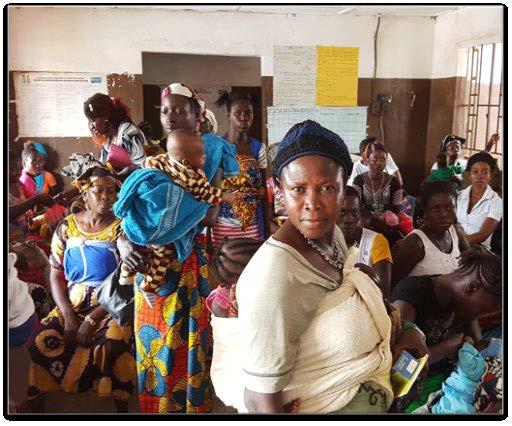
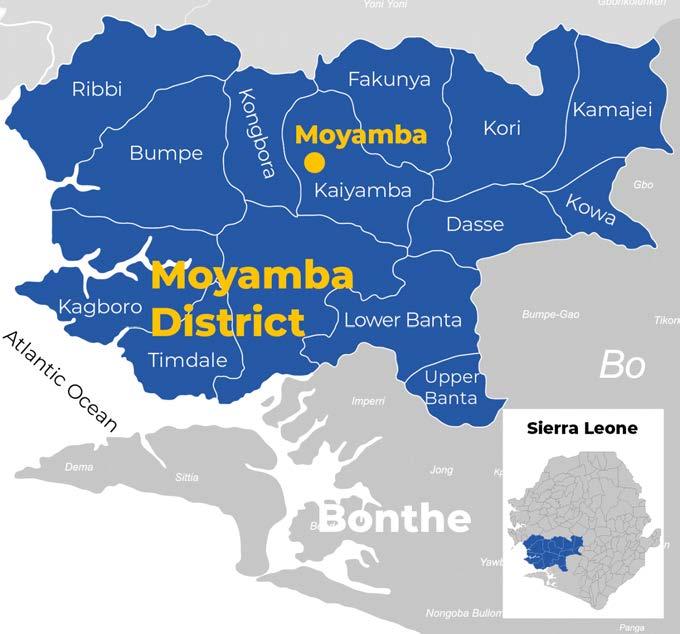
Sierra Leone has made significant progress in health sector development and maternal and child mortality reduction. But rates of avoidable disease and death are still too high. In 2023, the Ministry of Health launched a new Child Survival Action Plan (Fig. 16) accompanied by the creation of a new Child Health Division in government. These, together, constitute an exceptional opportunity to support integrated, strategic, government-led action on the health of mothers, infants and children.
15 RCPCH Global: Update 2024-26
Figure 14: Building basic healthcare access remains a challenge in Sierra Leone
Figure 15: Moyamba District - site of our collaborative assessment of the IMNCI programme
Although we have scaled down operational programming in the country (following aid cuts in 2021), we remain a committed partner supporting the Ministry and clinical colleagues across the country – from the central tertiary paediatric centre at Ola During to the smallest district facilities –helping to inform child health and to shape a strategic pathway forward, for example in starting to build and strengthen the network of neonatal care capabilities.
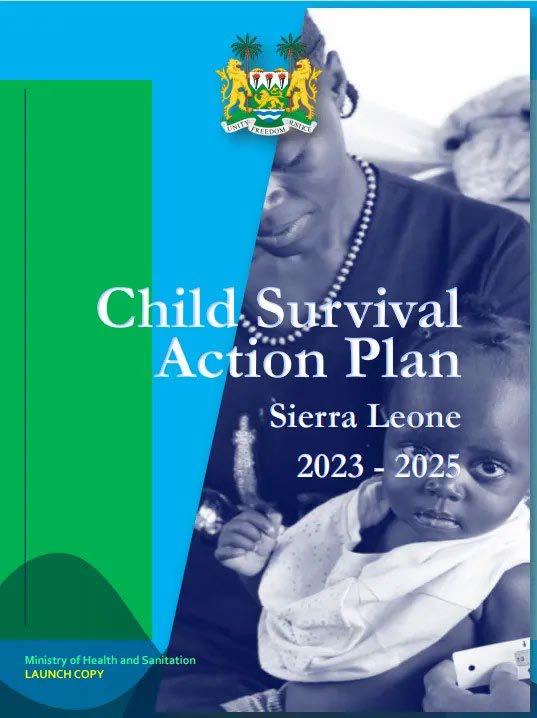
Figure 16: Sierra Leone’s new Child Survival Action Plan
We continue to support the specialisation of paediatric nursing through our ‘Caring for the Critically Ill Child’ (CCC) programme of on-the-ward, in-situ nurse-led training and practice mentoring – believing that Sierra Leone’s cadre of skilled and committed nurses represents one of its most powerful constituencies in building the health of its children into the future.
16 RCPCH Global: Update 2024-26
Myanmar
Prior to the military coup of February 2021, RCPCH Global worked in close partnership with the Myanmar Paediatric Society (MPS), collaborating across a range of interconnected programme streams from exams and the development of national clinical guidelines, through workplace-based learning, to practical quality improvement and system strengthening across regional and district hospitals in four states across the country.
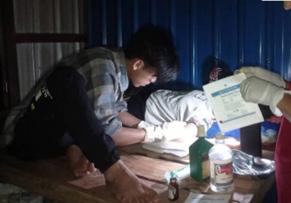
With the onset of the COVID pandemic, we built on relationships of personal and institutional trust to pivot towards support for respiratory care in under-resourced hospitals.
Following the military coup, the medic-led Civil Disobedience Movement (CDM) and the ensuing escalation of violence, RCPCH made the decision to remain engaged – shifting our operational focus into some of the outlying ethnic territories and building on our work with nurses providing frontline perinatal and paediatric care through pop-up clinics delivering life-saving care under the radar around the country (Fig. 17).
We made the decision to stay involved after the coup – largely through remote and virtual forms of support in place of field-based presence. Paradoxically, this has allowed us to extend the range and reach of our offer, assisting in the immediate preservation of life-saving care skills and services through a national cadre of doctors, nurses and associated primary and community health workers, but also working with local institutional partners to build the future health care system which will be needed as and when norms of democratic society return.
Working with a local partner and NGO we supported clinicians in four ‘pop up hospitals’. We undertook more than 200 hours of clinical supervision, training and support. The number of children treated rose significantly during the course of our support.
We have seen improvements in attendances in under fives in our four programme ‘pop-up’ hospitals in Myanmar. This is particuarly true in girls where attendances increased by 74% in a single year. The reasons for this are multi-factorial but clinical staff do report increased confidence in treating children following our programme of virtual support.
17 RCPCH Global: Update 2024-26
Figure 17: Post-coup, clinicians continue to offer care in pop-up clinics
18 RCPCH Global: Update 2024-26 0 1000 2000 3000 4000 5000 6000 7000 8000 2022 2023 0 500 1000 1500 2000 2500 3000 3500 4000 4500 5000 2022 2023
0 1000 2000 3000 4000 5000 6000 7000 8000 2022 2023 0 500 1000 1500 2000 2500 3000 3500 4000 4500 5000 2022 2023
Fig 18: Under five age group outpatient attendancies across four Myanmar pop-up hospitals
Fig 19: Under five age group Inpatient attendancies across four Myanmar pop-up hospitals
Myanmar stats:
clinical skills videos in Burmese language
38,650 views so far.
102 full length nursing lecture videos in English and Burmese
1,583 views
38,567 visitors to
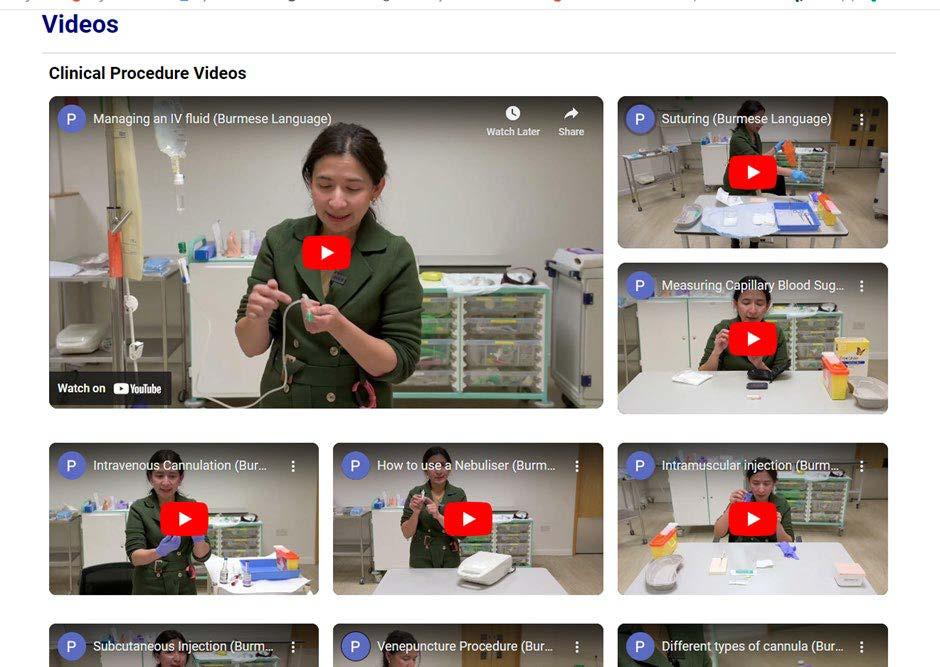
540 Memory sticks with resources sent to areas without mobile coverage
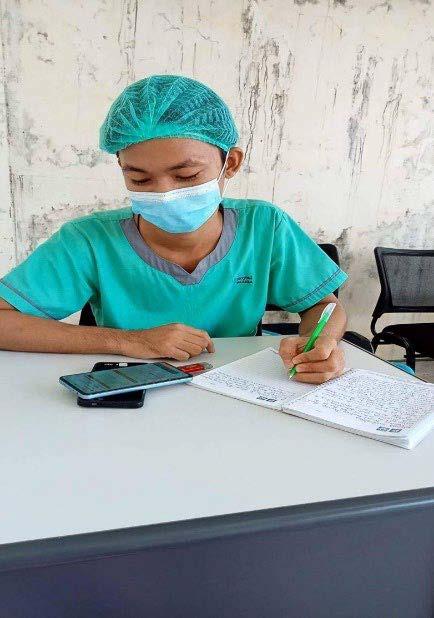
3,561 Facebook Group followers
912 Nurse subscribers to Telegram channel
undertake a degree in nursing
40 of those students now into 2nd year
19 RCPCH Global: Update 2024-26
Nigeria
In 2024, with support from the UK Foreign, Commonwealth and Development Office (FCDO), RCPCH Global will initiate a pilot programme in Osun State, southern Nigeria. This programme builds on our experience developing support for early child development and the management of developmental delays and disability (already established in Lebanon, and in development elsewhere, e.g. Rwanda). It is an example of strategic cross-learning between country programmes, as a way of maximising the efficiency and reach of our work.
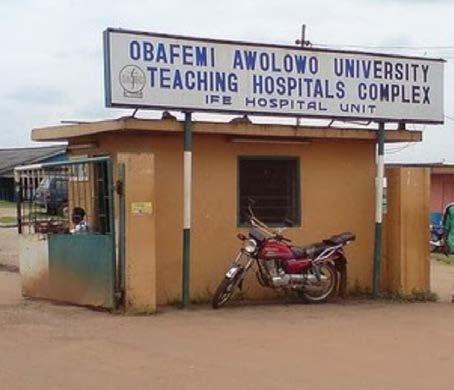
The programme partnership links colleagues at Alder Hey Children’s Hospital with new partners in paediatric neurodevelopment and clinical disability support at Obafemi Awolowo University (OAU), working with state-level health management institutions to ensure that new approaches may be embedded as and where proven effective – as well as offering wider opportunity to extend development and disability care practices into other states in the Nigerian federal system.
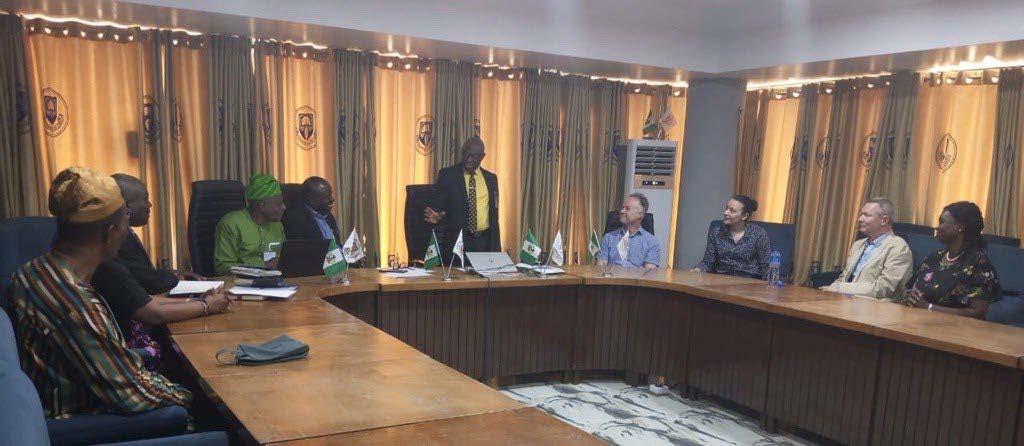
20 RCPCH Global: Update 2024-26
Figure 19: RCPCH’s new partnership with Obafemi Awolowo University
Figure 20: Meeting with the Vice-Chancellor and senior leadership of OAU
Multi-Country Assessment Programme
RCPCH Global is working with College members and colleagues in Nigeria, India and Pakistan to carry out small-scale observational assessments of maternal, neonatal and paediatric care quality in secondary-level facilities in one selected region in each country.
RCPCH is fortunate to have a large international membership, including significant representation from Nigeria, India and Pakistan – three of the largest and most influential emerging economies with extraordinary reserves of natural, technological, human and clinical resource, yet accounting for the highest rates of under-5 mortality in the world.
The premise of the assessments is to select a region of each country which is somewhere in the middle of the economic development spectrum – neither the best nor the worst performing – as an area in which secondary care facilities likely reflect both the backlog of historical challenges (in underinvestment and systemic weakness) and the potential for future advancement (in clinical management and integrated system strengthening).
In India, we worked with the State Ministry of Health in Maharashtra, and with clinical colleagues in Pune, Sangli and Satara Districts. In Nigeria, in 2024, we will work with colleagues in Kaduna State in the north, and Anambra in the south, carrying out on-site assessment of a small selection of district hospital-equivalents. In Pakistan, we aim to visit 3-4 district hospitals in the northern part of Sindh Province.
These assessment studies are very small-scale – unable to provide generalisable information across large, complex countries. But the hope is that, by working with clinicians embedded in their home systems, we will be able to pick up some insight into common challenges in the secondary tier of the health sector in large, emerging systems. This may allow us to do three things:
• To support local clinical colleagues in advocating with their own governments and ministries for greater, better targeted investment in secondary hospital care as a key strategy for continuing progress on paediatric morbidity and mortality.
• To inform wider policy discussion and debate internationally around the importance of secondary care development, and the identification of ‘best buys’ and effective strategies.
• To form the basis of new relationships between the UK and paediatric partners in key global child health geographies, on which we may seek to build further, larger operational programme partnerships.
21 RCPCH Global: Update 2024-26
Humanitarian Crises
The Royal College of Paediatrics and Child Health has a mandate and duty to speak up for the safety and well-being of children and their families wherever they find themselves in the world –in situations of poverty and underdevelopment, in conditions of social breakdown and violence, on the perilous routes following displacement, and as refugees and asylum-seeking minors.
In a world of humanitarian crises, institutions like RCPCH are faced with inevitable and challenging choices – whether and where to remain engaged and whether to withdraw for the purposes of security; whether we are the best-fit kind of agency to deliver the right kind of support in highly constrained situations or whether we should hold back and support others in their front-line roles; whether we are better suited to use our voice, working with others in global partnership, to advocate for the protection of children to keep making the argument for the universality of child rights, to be preserved by all parties at all times.
The College is privileged to have members, colleagues and friends in countries right around the world. We remain engaged with them all, sharing an inviolable commitment to the welfare of children. Where feasible – where we have mandate, comparative advantage, opportunity and necessary resource – we will always seek to explore opportunities for more focused support, bearing witness, joining voices, offering institutional, technical and clinical solidarity.
Conclusion
The Royal College of Paediatrics and Child Health leads the way for child health in the United Kingdom. But we are also engaged beyond the UK in helping to improve conditions for children and their families in regions of the world seeking to develop the clinical skills and systems of care on which global goals for health and development depend.
We do not see these as separate streams. Rather, we see global health as a level playing field in which clinicians from every region share a common language of aims and means. The unparalleled concentration of paediatric skills embodied in the College offers, without doubt, a unique resource to colleagues in other parts of the world. But engagement with that world offers invaluable lessons for medical colleges like ours, and for the wider future of a health system at home.
22 RCPCH Global: Update 2024-26
Partners
We would like to thank our partners:
Ministry of Health, Government of Rwanda
Rwanda Biomedical Center (RBC)
University Teaching Hospital of Rwanda (CHUK)
Partners in Health (PiH), Rwanda
Jhpiego
Ministry of Health and Sanitation, Government of Sierra Leone
UNICEF Sierra Leone
WHO Sierra Leone
Sierra Leone Nurses Association (SLNA)
Ola During Children’s Hospital
Ministry of Health and Population, Government of Nepal
Madesh Pradesh Provincial Administration
UNICEF Nepal
Nepal Paediatric Association (NEPAS)
Paediatric Nursing Association of Nepal (PNAN)
Kanti Children’s Hospital
Myanmar Civil Disobedience Movement (CDM)
UNICEF Myanmar
Malaria Consortium
Community Partners International (CPI)
Mae Tao Clinic
Palestinian Red Crescent Society (PRCS)
Palestinian Disability Forum (PDF)
UN Relief and Works Agency (UNRWA)
Medical Aid for Palestinians (MAP)
UNICEF Lebanon
American University at Beirut (AUB)
Al Hamshari Hospital
UNICEF HQ
UNICEF UK
WHO HQ
UNOPS
Government of Maharashtra/State Ministry of Health, India
Mukul Madhav Foundation (MMF)
Federal Ministry of Health, Government of Nigeria
Ministry of Health, Kaduna State, Nigeria
Ministry of Health, Anambra State, Nigeria
Obafemi Awolowo University (OAU), Osun State, Nigeria
Ahmadu Bello University Teaching Hospital (ABUTH), Kaduna State, Nigeria
Government of Sindh Province/Ministry of Health, Pakistan
Alder Hey Children’s Hospital
Great Ormond Street Children’s Hospital
Crown Agents
University of Liverpool
University of Oxford
Imperial College London
University of Coventry
Liverpool School of Tropical Medicine (LSTM)
London School of Hygiene and Tropical Medicine (LSHTM)
Kenya Paediatric Association (KPA)
Uganda Paediatric Association (UPA)
British Sudanese Association of Paediatrics and Child Health (BSAPCH)
Paediatric Society of Palestine (PSP)
British Association of Paediatricians of Indian Origin (BAPIO)
Medical Association of Nigerians Across Great Britain (MANSAG)
British Paediatric Neurology Association (BPNA)
International Child Health Group
Royal College of Obstetrics and Gynaecology (RCOG)
Royal College of Nursing (RCN)
Royal College of Midwives (RCM)
James Percy Foundation
Burdett Trust
Tropical Health and Education Trust (THET)
Cambridge Global Health Partnerships
King’s Global Health Partnerships
Foreign Commonwealth and Development Office (FCDO)
23 RCPCH Global: Update 2024-26
RCPCH Global Update 2024-26
Royal College of Paediatrics and Child Health
Leading the way in Children’s Health
RCPCH
©RCPCH 2024
The Royal College of Paediatrics and Child Health (RCPCH) is a registered charity in England and Wales (1057744) and in Scotland (SC038299).


























